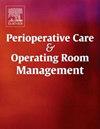专门化对下第三磨牙拔牙发病率的影响
IF 1
Q2 Nursing
Perioperative Care and Operating Room Management
Pub Date : 2025-04-23
DOI:10.1016/j.pcorm.2025.100492
引用次数: 0
摘要
目的拔除阻生第三磨牙是颌面外科最常见的手术之一。在这些手术后,可以看到诸如咬关、疼痛和肿胀等症状,这些症状对患者的舒适度产生负面影响,并被定义为术后并发症。外科医生的经验是影响术后发病率的重要因素之一。方法通过口腔颌面外科医生和口腔颌面外科助理(研究助理)对100例患者的下颌阻生磨牙进行拔牙。我们记录了所有患者的疼痛、肿胀和最大切口测量三次:术前、术后第二天和术后第7天。我们通过记录第一次切开和最后一次缝合之间的时间来确定手术次数。结果口腔颌面外科医生与口腔颌面外科助理(研究助理)相比,外科医生的手术时间更短(p <;0.001)。当我们在术后第2天和第7天评估面部肿胀时,我们发现外科医生手术的患者肿胀较少(p <;0.001, p: 0.005)。在我们术后第2天的测量中,手术患者的口腔开放性更大(p:0.035)。结论由口腔颌面外科医生行阻生第三磨牙手术可降低术后发病率。本文章由计算机程序翻译,如有差异,请以英文原文为准。
The effect of specialization on morbidity in lower third molar extraction
Objectives
Extracting impacted third molar teeth is one of the most common procedures in maxillofacial surgery. After these operations, symptoms such as trismus, pain, and swelling are seen, negatively affecting patient comfort and defined as postoperative morbidities. The surgeon's experience is one of the considerable factors affecting postoperative morbidity.
Methods
With our research, we extracted the mandibular impacted molar teeth of 100 patients by oral, teeth, and maxillofacial surgeons and oral and maxillofacial surgery assistants(research assistant). We recorded all patients' pain, swelling, and maximum incisal opening measurements three times: preoperative, postoperative second day, and seventh postoperative day. We determined the operation times by recording the time between the first incision and the last suture.
Results
When we compared oral and maxillofacial surgeons and oral and maxillofacial surgery assistants(research assistant), the operating time of the surgeon was shorter (p < 0.001). When we evaluated the facial swelling on the postoperative second and seventh days, we found that the patients operated on by the surgeon had less swelling (p < 0.001, p:0.005). In our postoperative second-day measurement, the oral openness of the patients operated by the surgeon was greater (p:0.035).
Conclusion
Performing the impacted third molar operations by an oral and maxillofacial surgeon reduces postoperative morbidity.
求助全文
通过发布文献求助,成功后即可免费获取论文全文。
去求助
来源期刊

Perioperative Care and Operating Room Management
Nursing-Medical and Surgical Nursing
CiteScore
1.30
自引率
0.00%
发文量
52
审稿时长
56 days
期刊介绍:
The objective of this new online journal is to serve as a multidisciplinary, peer-reviewed source of information related to the administrative, economic, operational, safety, and quality aspects of the ambulatory and in-patient operating room and interventional procedural processes. The journal will provide high-quality information and research findings on operational and system-based approaches to ensure safe, coordinated, and high-value periprocedural care. With the current focus on value in health care it is essential that there is a venue for researchers to publish articles on quality improvement process initiatives, process flow modeling, information management, efficient design, cost improvement, use of novel technologies, and management.
 求助内容:
求助内容: 应助结果提醒方式:
应助结果提醒方式:


